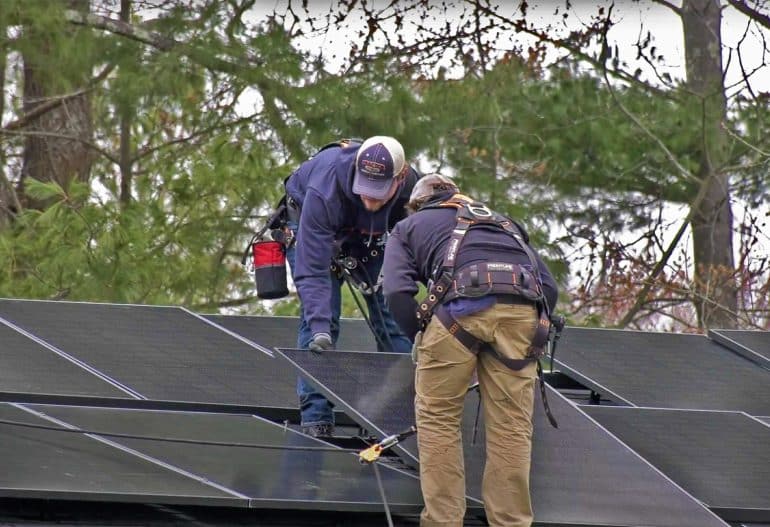Homeowners exploring solar power for the first time are often surprised to learn that there are three types of solar power systems to consider – grid-tie, off-grid, and hybrid systems. Each system requires its own unique equipment, and costs vary, so it’s important that homeowners are well-educated about the options in order to make the best choice to meet their solar energy needs.
Grid-Tie Solar Power Systems
The most cost-effective and popular of the three solar options, grid-tie systems are tied to “the grid” – the local utility company’s complex network that captures electricity from a power plant and delivers it to homes. Grid-tie solar systems send all the energy generated by the solar panels to the grid, where it is stored until needed. If a solar energy system includes net metering, the homeowner will receive credit for any power they generate and can use that energy at any time. The one exception is during a power outage when the grid is down since a grid-tie system is tied to that infrastructure.
Grid-tie solar power systems are considered the best option if you’re looking to offset your electricity bill, and they typically pay for themselves in electricity savings within 5-10 years. They also offer a backup plan in the event that your system doesn’t generate enough power, as you can default to the grid to supplement your home energy needs.
Off-Grid Solar Power Systems
This option is for homeowners located in remote locations without access to a utility line that would connect their solar power system to the grid. Off-grid systems rely 100 percent on the homeowner generating their own electricity and require a generator in the event of several days of cloudy or bad weather. The positive aspect of an off-grid system is that you can live anywhere and still take advantage of solar energy as long as you have sunlight. However, a negative factor is that off-grid system owners often need to ration their energy consumption. Strategies include alternating days using the dishwasher and dryer, or using large appliances only during times of peak energy production.
Hybrid or Battery Backup Solar Power Systems
Referred to as either hybrid or backup, this solar power system option offers the best of both worlds – the convenience of being connected to the grid, but with a backup in the event of a power outage or lack of sunlight to power your home. This is possible by adding a solar battery to your system, which allows your inverter to automatically disconnect from the grid and draw energy stored in a battery to keep your home powered. This type of system has gained immense popularity in areas of the U.S. that are prone to natural disasters and extreme weather events.
Determining what type of solar energy system works for you requires a detailed conversation with a qualified, trusted solar provider like Smart Green Solar. Reach out today for a consultation and have all your questions answered.
Considering solar? Use our Solar Savings Calculator to obtain a custom solar savings estimate for your home. We invite you to learn more about Smart Green Solar, our core values, and our unique approach–which has led to us becoming a leading full-service provider in Rhode Island, Massachusetts, and Connecticut.







